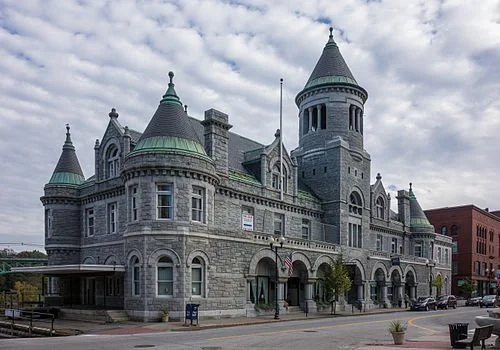
Scott Klinger: Trump’s postmaster general continues to wreak havoc as Christmas nears
The old post office in Augusta, Maine, a notable example of Romanesque architecture
Via OtherWords.org
HARPSWELL, Maine
Last year’s holiday season was not exactly a merry one for the U.S. Postal Service. In the lead-up to Christmas, overwhelmed postal workers had to leave gifts sitting in sorting facilities for weeks. They delivered just 38 percent of greeting cards and other nonlocal first-class mail on time.
What should we expect this year?
USPS leaders claim they are ready for the rush. But customers have reason to worry about slower — and more expensive — service.
The service is aiming to hire 40,000 seasonal workers for the holidays. But that’s 10,000 less than last year — and given broader pandemic staffing shortages, recruitment and retention for these demanding jobs will not be easy. While the e-commerce surge that strained the system last year has declined somewhat, postal workers are still delivering many more packages than before the crisis.
And COVID-19 is not the only reason for concern. In fact, the root causes of our country’s postal problems are inaction by Congress and misguided action by USPS leadership.
For more than a decade, Congress has failed to fix a policy mistake that requires the Postal Service to set aside money to prefund retiree health care more than 50 years in advance. This burden, which applies to no other federal agency or private corporation, accounts for 84 percent of USPS reported losses from 2007 to 2020. If Congress had made the same demand of America’s strongest businesses, many would be bankrupt.
A bill to repeal this pre-funding mandate and put USPS on a stronger financial footing enjoys strong bipartisan support. But House and Senate leaders have not brought up this bill, the Postal Reform Act, for a vote.
In the meantime, U.S. Postmaster General Louis DeJoy, a Trump campaign contributor, is using the agency’s artificially large losses to justify jacking up prices and slowing deliveries.
If you’re planning to send holiday cards a significant distance this season, say from Pittsburgh to Boise, the USPS delivery window is now five days instead of three. These reduced service standards affect about 40 percent of First Class mail.
As part of a 10-year plan, DeJoy is also slowing delivery by 1 to 2 days for about a third of First Class packages. These are small parcels often used to ship highly time-sensitive medications, as well as other lightweight e-commerce purchases.
A big cause of the slowdown: DeJoy’s plan to cut costs by shifting long-distance deliveries from planes to trucks. This is a rollback of the introduction of airmail more than 100 years ago — one of many postal innovations that strengthened the broader U.S. economy.
For worse service, we’ll have to pay more.
In August, USPS raised rates for First Class mail by 6.8 percent and for package services by 8.8 percent. A holiday surcharge will raise delivery costs by as much as $5 per package through December 26. In January, rates for popular flat-rate boxes and envelopes will increase by as much as $1.10.
Next up on DeJoy’s plan: reduced hours at some post offices and the closure of others.
USPS officials argue these draconian moves will boost profits. But even the regulator that oversees the agency has criticized the underlying financial analysis.
Instead, DeJoy’s 10-year plan will more likely drive customers away. That, in turn, will lead to fewer of the good postal jobs that have been a critical path to the middle class, particularly for Black families.
Unless Washington lawmakers lift the financial burden they imposed on USPS, DeJoy will be empowered to keep up his self-defeating cost-cutting spree.
Postal workers and their customers have struggled to overcome the extreme challenges of the pandemic. Now it’s time for Congress to deliver by passing the Postal Reform Act and urging USPS leaders to focus on innovations to better serve all Americans for generations to come
Scott Klinger, who lives in Harpswell, is senior equitable development specialist at Jobs With Justice.
On Ragged Island, Harpswell, Maine, circa 1920
James E. Varner: Trump tool DeJoy assaults Postal Service
The U.S. Post Office in the old mill village of Whitinsville, Mass., part of the town of Northbridge. Like many attractive post offices, it was built as part of the New Deal’s Works Progress Administration. Opened in 1938, it’s a Colonial Revival masonry building, built of brick and cast stone, capped by a hip roof and cupola and with pilasters flanking the central entrance.
Via OtherWords.org
President Trump’s postmaster general, Louis DeJoy, recently testified before Congress about major slowdowns in mail delivery under his watch.
As a 20-year postal veteran, I had only one reaction: DeJoy needs to be Returned to Sender.
DeJoy, a Trump fundraiser who owns millions worth of stock in U.S. Postal Service competitors, has been on the job barely two months. But already, his changes have caused serious delays in delivery.
Ostensibly, these moves are cost-saving measures. But it doesn’t take a partisan cynic to understand how this kind of disruption could affect voting in November’s election. The president himself has said that he hopes as much.
Postal employees pride ourselves on a culture of never delaying the mail. Our unofficial mantra can best be summed up as, “Mail that comes in today, goes out today — no matter what.”
We are now being told to ignore that. If mail can’t get delivered or processed without overtime, it is supposed to sit and wait. That can mean big delays.
For example, letter carriers normally split up the route of a colleague who’s on vacation or out sick. These carriers each take a portion of the absent employee’s route after completing their own, often using a little bit of overtime. Now, that mail doesn’t get delivered until much later.
Then there’s the mail that arrives late in the day. Before, late arriving mail would often be processed for the next day’s delivery, even if that required the use of overtime. Today, that mail sits in the plant at least until the following evening. Mail arriving late on a Saturday or a holiday weekend could be delayed even longer.
In the plants, meanwhile, the short staffing of clerks means it takes longer to get all the mail through the sorting machines. To make matters worse, under orders from DeJoy, mail-processing equipment is also being scrapped.
Even though the processing takes longer, drivers aren’t allowed to wait on it. Postal truck drivers are being disciplined for missing their departure time even by a few minutes — even if they haven’t gotten all the mail they’re supposed to haul. In some cases, the trucks that leave are completely empty!
With package deliveries up by 50 percent during the pandemic, as the Institute for Policy Studies reports, large mail trucks operating between facilities are often already full. Imagine how much mail will get left behind when that’s combined with seasonal holiday mail, or a large number of absentee ballots.
Finally, DeJoy’s proposals to cut hours of operation at many smaller post offices — and the removal of many public mailboxes — will make it harder for the public to access postal services.
When you limit hours to 9 a.m. to 2 p.m. and close on Saturdays, you eliminate access for anybody working the day shift. Throw in mandatory closure for lunch breaks in the middle of the day, and it makes matters that much worse for our customers.
Postal workers have been doing their best to keep the nation’s mail and packages moving in these difficult and hazardous times. We don’t deserve these attacks.
DeJoy now says he’ll delay more changes until after the election, but he also had the nerve to tell Congress that he wouldn’t replace the 600 sorting machines he’d already removed.
Delaying more changes isn’t enough. Instead, Congress must approve crisis relief for USPS — and reverse DeJoy’s disastrous service cuts altogether.
James E. Varner is the director of Motor Vehicle Service at American Postal Workers Union Local 443 in Youngstown, Ohio. This op-ed was adapted from a letter published in the Warren Tribune-Chronicle.




